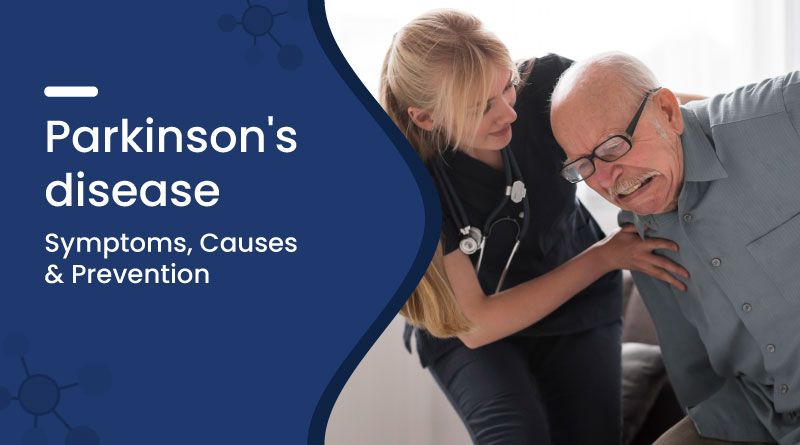Parkinson's Disease Symptoms, Causes & Prevention


Parkinson's disease could also be a progressive nervous system disorder that affects movement. Symptoms start gradually, sometimes starting with a barely noticeable tremor in just one hand. Tremors are common, but the disorder also commonly causes stiffness or slowing of movement.
In the early stages of Parkinsonism, your face may show little or no expression. Your arms won't swing once you walk. Your speech may become soft or slurred. Parkinsonism symptoms worsen as your condition progresses over time.
Although Parkinsonism can't be cured, medications might significantly improve your symptoms. Occasionally, your doctor may suggest surgery to manage certain regions of your brain and improve your symptoms.
Symptoms
Parkinson's disease signs and symptoms are often different for everyone. Early signs could even be mild and go unnoticed. Symptoms often begin on one side of your body and typically remain worse thereon side, even after symptoms begin to affect all sides.
Parkinson's signs and symptoms may include:
- Tremor. A tremor, or shaking, usually begins during a limb, often your hand or fingers. You’ll rub your thumb and forefinger back-and-forth mentioned as a pill-rolling tremor. Your hand may tremor when it's at rest.
- Slowed movement (bradykinesia). Over time, Parkinsonism's may slow your movement, making simple tasks difficult and time-consuming. Your steps may become shorter once you walk. It’s getting to be difficult to urge out of a chair. You’ll drag your feet as you're trying to steer.
- Rigid muscles. Muscle stiffness may occur in any neighborhood of your body. The stiff muscles are often painful and limit your range of motion.
- Impaired posture and balance. Your posture may become stooped, otherwise, you'll have balance problems as a result of Parkinsonism.
- Loss of automatic movements. You’ll have a decreased ability to perform unconscious movements, including blinking, smiling, or swinging your arms once you walk.
- Speech changes. You’ll speak softly, quickly, slur, or hesitate before talking. Your speech could even be more of a monotone rather than with the quality inflections.
- Writing changes. It’s getting to become hard to write down, and your writing may appear small.
Causes
In Parkinson's, certain nerve cells (neurons) within the brain gradually break down or die. Many of the symptoms are because of a loss of neurons that produce a chemical messenger in your brain called dopamine. When dopamine levels decrease, it causes abnormal brain activity, leading to symptoms of Parkinsonism.
The explanation for Parkinsonism is unknown, but several factors appear to play a task, including:
- Your genes. Researchers have identified specific genetic mutations that can cause Parkinsonism. But these are uncommon except in rare cases with many relations affected by Parkinsonism.
However, certain gene variations appear to increase the danger of Parkinsonism but with a relatively small risk of Parkinsonism for each of these genetic markers.
- Environmental triggers. Exposure to certain toxins or environmental factors may increase the danger of later Parkinsonism, but the danger is relatively small.
Researchers have also noted that tons of changes occur within the brains of people with Parkinsonism, although it is not clear why these changes occur. These changes include:
- The presence of Lewy bodies. Clumps of specific substances within brain cells are microscopic markers of Parkinsonism. These are called Lewy bodies, and researchers believe these Lewy bodies hold an important clue to the reason for Parkinsonism.
- Alpha-synuclein is found within Lewy bodies. Although many substances are found within Lewy bodies, scientists believe an important one is that the natural and widespread protein called alpha-synuclein (a-synuclein). It's found altogether Lewy bodies during a clumped form that cells can't break down. This is often currently an important focus among Parkinsonism researchers.
Risk factors
Risk factors for Parkinsonism include:
- Age. Young adults rarely experience Parkinsonism. It ordinarily begins in middle or late life, and thus the danger increases with age. People usually develop the disease around age 60 or older.
- Heredity. Having a thorough relative with Parkinsonism increases the possibility that you are going to develop the disease. However, your risks are still small unless you've many relatives in your family with Parkinsonism.
- Gender. Men are more likely to develop Parkinsonism than are women.
- Exposure to toxins. Ongoing exposure to herbicides and pesticides may slightly increase your risk of Parkinsonism.
Complications
Parkinson's disease is typically amid these additional problems, which may be treatable:
- Thinking difficulties. You’ll experience cognitive problems (dementia) and thinking difficulties. These usually occur within the later stages of Parkinsonism. Such cognitive problems aren't very conscious of medications.
- Depression and emotional changes. You’ll experience depression, sometimes within the very early stages. Receiving treatment for depression can make it easier to handle the other challenges of Parkinsonism.
You may also experience other emotional changes, like fear, anxiety, or loss of motivation. Doctors may provide you with medications to treat these symptoms.
- Swallowing problems. You’ll develop difficulties with swallowing as your condition progresses. Saliva may accumulate in your mouth because of slowed swallowing, leading to drooling.
- Chewing and eating problems. Late-stage Parkinsonism affects the muscles in your mouth, making chewing difficult. This may cause choking and poor nutrition.
- Sleep problems and sleep disorders. People with Parkinsonism often have sleep problems, including awakening frequently throughout the night, awakening early, or falling asleep during the day.
People also can experience rapid eye movement sleep behavior disorder, which involves acting out your dreams. Medications may help your sleep problems.
- Bladder problems. Parkinsonism may cause bladder problems, including being unable to manage urine or having difficulty urinating.
- Constipation. Many folks with Parkinsonism develop constipation, mainly because of a slower alimentary tract.
You may also experience:
- Vital sign changes. You’ll feel dizzy or lightheaded once you stand because of a sudden drop in sign (orthostatic hypotension).
- Smell dysfunction. You’ll experience problems alongside your sense of smell. You’ll have difficulty identifying certain odors or the difference between odors.
- Fatigue. Many folks with Parkinsonism's lose energy and knowledge fatigue, especially later within the day. The cause isn't known.
- Pain. Some people with Parkinsonism's experience pain, either in specific areas of their bodies or throughout their bodies.
- Physical Relation dysfunction. Some people with Parkinsonism notice a decrease in concupiscence or performance.
Prevention
Because the reason for Parkinson's is unknown, proven ways to prevent the disease also remain a mystery.
Some research has shown that regular aerobics might reduce the danger of Parkinsonism.
Some other research has shown that people who drink caffeine — which is found in coffee, tea, and cola — get Parkinsonism's less often than people who don't drink it. However, it's still not known whether caffeine actually protects against getting Parkinson's, or is claimed indifferently. Currently, there's not enough evidence to suggest drinking caffeinated beverages to protect against Parkinson's. Tea is additionally related to a reduced risk of developing Parkinsonism.
Recent Blogs
Disclaimer : Zeelab Pharmacy provides health information for knowledge only. Do not self-medicate. Always consult a qualified doctor before starting, stopping, or changing any medicine or treatment.
















 Added!
Added!